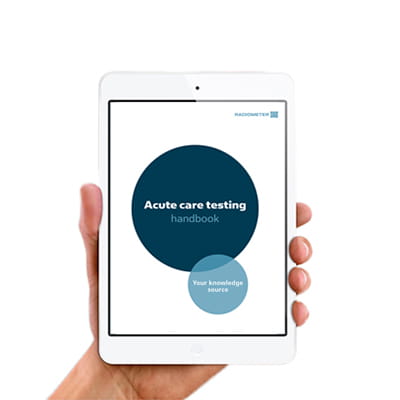Printed from acutecaretesting.org
Journal Scan
June 2017
Long-term consequence of acute kidney injury (AKI)
Summarized from Horne K, Packington R, Monaghan J et al. Three year outcomes after acute kidney injury: results of a prospective parallel group cohort study. BMJ Open 2017; 7: e015316
Acute kidney injury (AKI) is defined as an abrupt decrease in kidney function evidenced by recent (within 48 hours) increase in serum creatinine concentration equal to or greater than 26.5 µmol/L (0.3 mg/dL). It can be a complication of many conditions that warrant hospital admission so it is common; up to 20 % of hospitalized patients have AKI. Three levels of AKI severity – stage 1 (mild) to stage 3 (severe) – are defined by the magnitude of serum creatinine increase.
Chronic kidney disease (CKD) is distinguished from AKI by its slowly progressive, irreversible natural history. The once conventional wisdom that AKI (unlike CKD) is a potentially entirely reversible condition is now challenged. Recent research has shown that those who survive an episode of AKI are at increased risk of CKD and recurrent AKI in the future.
Further evidence that patients who survive AKI are at increased risk of CKD is provided by the recently published results of a prospective cohort pilot study conducted by researchers at the Royal Derby Hospital in the UK.
For this study, investigators utilized hospital laboratory records to identify 150 patients who suffered AKI during their hospital admission (the exposed group) and 150 patients who did not suffer AKI during their hospital admission (the non-exposed group).
The non-exposed group was composed by matching each exposed patient to one of similar age and similar baseline renal function (estimated glomerular filtrate rate eGFR) at emergency room admission. Both exposed and non-exposed groups thus had the same proportion of patients with normal renal function (∼67 %), or preexisting CKD of similar severity.
All 300 study participants were recruited 3 months after hospital admission and invited for follow-up assessment of renal function at 3 months, 1 year and 3 years.
Of the 150 study participants in the exposed group, 105 (70 %) had mild, stage 1 AKI, 24 (16 %) had stage 2 AKI and 21 (14 %) had stage 3 AKI. Renal function (eGFR) was significantly lower in the exposed group than the non-exposed group at all three follow-up time points. At 3 years, mean eGFR of the exposed group was 60.7 ± 21 mL/min/1.73 m2, compared with 68.4 ± 21 mL/min/1.73m2 in the non-exposed group.
Progression of CKD, defined as decline in eGFR ≥25 % in association with decline in eGFR stage, was greater in the AKI-exposed than in the non-exposed group. At 3 years, progression had occurred in 30 (24.6 %) of the AKI group, but only 10 (7.5 %) of the non-exposed group.
This difference in CKD progression was already evident at 3 months, when no non-exposed patients had shown progression, but 14 of the 30 AKI-exposed patients already showed progression. Notably, when analysis of CKD progression was confined to those with mild (stage 1) AKI, a similar proportion (24.1 %) of exposed patients showed evidence of CKD progression.
A higher proportion of AKI-exposed than non-exposed study participants developed albuminuria and recurrent AKI during follow-up. Further statistical analysis directed at better defining which AKI patients are most at risk of future CKD found that the following were independently associated with development/progression of CKD: non-recovery from AKI at 90 days; male gender, diabetes and recurrent AKI.
This study adds to accumulating evidence that there are potential detrimental long-term consequences for the kidney function of patients who have survived an episode of AKI, even if that AKI was mild (stage 1). They are at greater than normal risk of developing CKD, and at greater than normal risk of speedier CKD progression if they already had CKD at the time of the AKI episode.
Chronic kidney disease (CKD) is distinguished from AKI by its slowly progressive, irreversible natural history. The once conventional wisdom that AKI (unlike CKD) is a potentially entirely reversible condition is now challenged. Recent research has shown that those who survive an episode of AKI are at increased risk of CKD and recurrent AKI in the future.
Further evidence that patients who survive AKI are at increased risk of CKD is provided by the recently published results of a prospective cohort pilot study conducted by researchers at the Royal Derby Hospital in the UK.
For this study, investigators utilized hospital laboratory records to identify 150 patients who suffered AKI during their hospital admission (the exposed group) and 150 patients who did not suffer AKI during their hospital admission (the non-exposed group).
The non-exposed group was composed by matching each exposed patient to one of similar age and similar baseline renal function (estimated glomerular filtrate rate eGFR) at emergency room admission. Both exposed and non-exposed groups thus had the same proportion of patients with normal renal function (∼67 %), or preexisting CKD of similar severity.
All 300 study participants were recruited 3 months after hospital admission and invited for follow-up assessment of renal function at 3 months, 1 year and 3 years.
Of the 150 study participants in the exposed group, 105 (70 %) had mild, stage 1 AKI, 24 (16 %) had stage 2 AKI and 21 (14 %) had stage 3 AKI. Renal function (eGFR) was significantly lower in the exposed group than the non-exposed group at all three follow-up time points. At 3 years, mean eGFR of the exposed group was 60.7 ± 21 mL/min/1.73 m2, compared with 68.4 ± 21 mL/min/1.73m2 in the non-exposed group.
Progression of CKD, defined as decline in eGFR ≥25 % in association with decline in eGFR stage, was greater in the AKI-exposed than in the non-exposed group. At 3 years, progression had occurred in 30 (24.6 %) of the AKI group, but only 10 (7.5 %) of the non-exposed group.
This difference in CKD progression was already evident at 3 months, when no non-exposed patients had shown progression, but 14 of the 30 AKI-exposed patients already showed progression. Notably, when analysis of CKD progression was confined to those with mild (stage 1) AKI, a similar proportion (24.1 %) of exposed patients showed evidence of CKD progression.
A higher proportion of AKI-exposed than non-exposed study participants developed albuminuria and recurrent AKI during follow-up. Further statistical analysis directed at better defining which AKI patients are most at risk of future CKD found that the following were independently associated with development/progression of CKD: non-recovery from AKI at 90 days; male gender, diabetes and recurrent AKI.
This study adds to accumulating evidence that there are potential detrimental long-term consequences for the kidney function of patients who have survived an episode of AKI, even if that AKI was mild (stage 1). They are at greater than normal risk of developing CKD, and at greater than normal risk of speedier CKD progression if they already had CKD at the time of the AKI episode.
Disclaimer
May contain information that is not supported by performance and intended use claims of Radiometer's products. See also Legal info.
Acute care testing handbook
Get the acute care testing handbook
Your practical guide to critical parameters in acute care testing.
Download nowScientific webinars
Check out the list of webinars
Radiometer and acutecaretesting.org present free educational webinars on topics surrounding acute care testing presented by international experts.
Go to webinars







